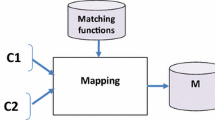Abstract
Many types of information are geographically referenced and interactive maps provide a natural user interface to such data. However, the process to access and retrieve geospatial data presents several problems related to heterogeneity and interoperability of the geospatial information. Thus, information integration and semantic heterogeneity are not trivial tasks. Therefore, we propose a web-mapping system focused on retrieving geospatial information by means of geospatial ontologies and representing this information on the Internet. Moreover, a Multi-Agent System is proposed to deal with the process related to obtain the tourist geo-information, which aids in the information-integration task for several nodes (geographic sites) that are involved in this application. The agent system provides the mechanism to communicate different distributed and heterogeneous Geographic Information Systems and retrieves the data by means of GML description. Also, this paper proposes an interoperability approach based on geospatial ontologies matching that is performed by the Multi-Agent System in each node considered in the application. The retrieval mechanism is based on encoding the information in a GML description to link each geospatial data with a concept of the ontologies that have been proposed.
Access this chapter
Tax calculation will be finalised at checkout
Purchases are for personal use only
Preview
Unable to display preview. Download preview PDF.
Similar content being viewed by others
References
Li, M., Zhou, S., Jones, C.B.: Multi-agent Systems for Web-Based Map Information Retrieval. In: Egenhofer, M.J., Mark, D.M. (eds.) GIScience 2002. LNCS, vol. 2478, pp. 161–180. Springer, Heidelberg (2002)
Mark, D., Smith, B., Egenhofer, M., Hirtle, S.: Ontological Foundations for Geographic Information Science. In: McMaster, R., Usery, L. (eds.) A Research Agenda for Geographic Information Science, pp. 335–350. CRC Press, Boca Raton (2004)
Maes, P.: Modeling Adaptive Autonomous Agents. Artificial Life 1, 135–162 (1994)
Fonseca, F., Egenhofer, M., Agouris, P.: Using Ontologies for Integrated Geographic Information Systems. Transactions in GIS 6(3), 25–40 (2002)
Egenhofer, M., Frank, A.: Naive Geography. In: Kuhn, W., Frank, A.U. (eds.) COSIT 1995. LNCS, vol. 988, pp. 1–15. Springer, Heidelberg (1995)
Guarino, N.: Formal Ontology, Conceptual Analysis and Knowledge Representation. International Journal of Human and Computer Studies 43(5-6), 625–640 (1999)
Torres, M., Quintero, R., Moreno, M., Fonseca, F.: Ontology-driven description of spatial data for their semantic processing. In: Rodríguez, M.A., Cruz, I., Levashkin, S., Egenhofer, M.J. (eds.) GeoS 2005. LNCS, vol. 3799, pp. 242–249. Springer, Heidelberg (2005)
Author information
Authors and Affiliations
Editor information
Rights and permissions
Copyright information
© 2007 Springer-Verlag Berlin Heidelberg
About this paper
Cite this paper
Torres, M., Levachkine, S., Moreno, M., Quintero, R., Guzmán, G. (2007). Retrieving Geospatial Information into a Web-Mapping Application Using Geospatial Ontologies. In: Nguyen, N.T., Grzech, A., Howlett, R.J., Jain, L.C. (eds) Agent and Multi-Agent Systems: Technologies and Applications. KES-AMSTA 2007. Lecture Notes in Computer Science(), vol 4496. Springer, Berlin, Heidelberg. https://doi.org/10.1007/978-3-540-72830-6_28
Download citation
DOI: https://doi.org/10.1007/978-3-540-72830-6_28
Publisher Name: Springer, Berlin, Heidelberg
Print ISBN: 978-3-540-72829-0
Online ISBN: 978-3-540-72830-6
eBook Packages: Computer ScienceComputer Science (R0)





